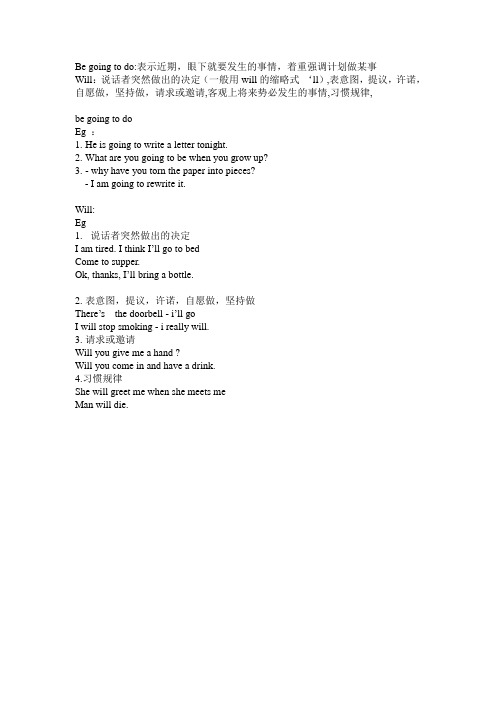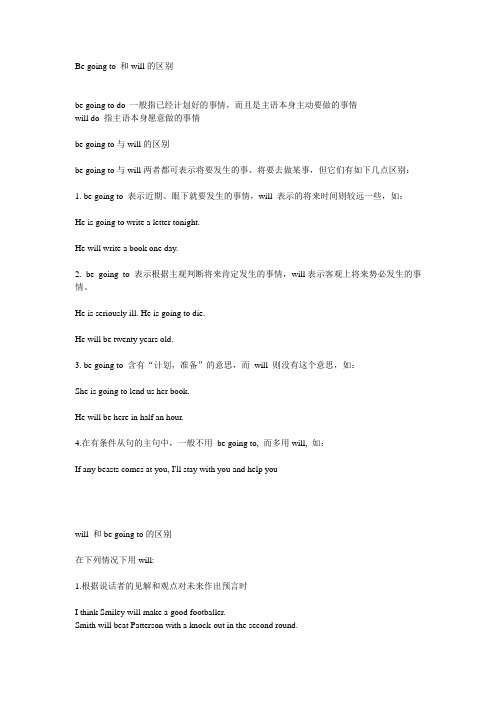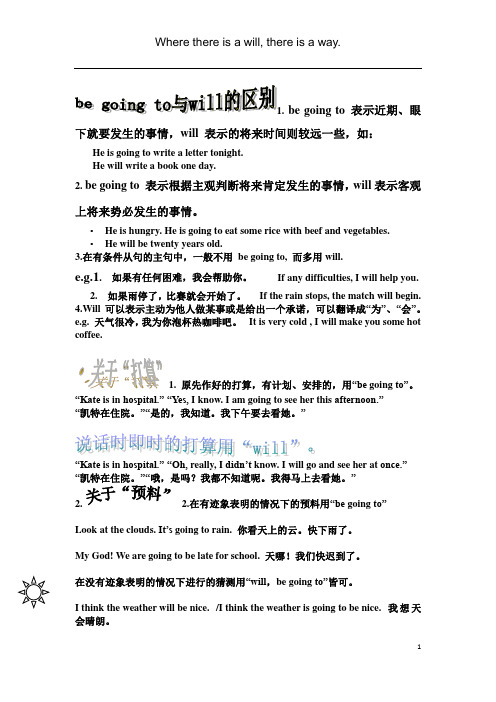一般将来时be going to 与will的解析和练习
- 格式:ppt
- 大小:1.20 MB
- 文档页数:23


英语语法一般将来时be going to用法和习题be going to +动词原形=will +动词原形将要做.../打算做...1、肯定句结构:主语+be(am/is/are)going to +动词原形2、否定句结构:主语+be (am/is/are) not going to +动词原形3、一般疑问句结构:be (am/is/are) +主语+going to +动词原形肯定回答:Yes,主语(人称代词)+am/is/are.否定回答:No, 主语(人称代词)+am/is/are +not.be动词用法口诀I 用_____, you 用_____, is 连着____、_____、_____.单数用_____, 复数用______(一)选择填空。
()1.I ____ going to play football tomorrow. A.is B.am C.are ()2.She ____ going to climb mountain(爬山). A.am B.is C.are ()3.He ____ going to swim. A.am B.are C.is()4.They____ going to go to school. A.am B.is C.are()5.You____ going to go to bed. A.am B.are C.is()6.Lucy’s mother ____ going to watch TV. A am B is C are ()7.____ she going to dance? A.am B.is C.are()8.____ you going to have lunch? A.am B.is C.are()9.____ I going to play the piano? A am B is C are()10.I am going to ______ stories. A read B reads C reading()11.She is going to ______ the violin. A play B plays C playing ()12.Are we going to ______a play? A puts on B putting on Cput on ()13.Is my sister going to ______? A drawing B draws Cdraw ()14.What are you going to ______? A does B do Cdoing()15.Where are we going to ______? A go shopping B goes shopping (二)把下列肯定句变为否定句。

六年级英语将来时be going to 和will 用法区别拓展单选题50题1.I_____play football tomorrow.A.am going toB.willC.amD.be答案:A。
本题考查be going to 和will 的用法区别。
be going to 表示有计划、打算做某事;will 表示主观意愿、临时决定做某事。
本题中“明天踢足球”更倾向于有计划的行为,所以选A。
2.She_____read a book this evening.A.is going toB.willC.beD.am答案:A。
“今晚读书”是有一定计划的行为,所以用be going to,主语是she,be 动词用is,选A。
3.We_____go to the park on Sunday.A.am going toB.willC.are going toD.be答案:C。
we 后面的be 动词用are,“周日去公园”可以看作是有计划的行为,所以选C。
4.He_____visit his grandparents next week.A.is going toB.willC.beD.am答案:A。
“下周去看望祖父母”更倾向于有计划的行为,主语是he,be 动词用is,选A。
5.They_____have a picnic tomorrow.A.are going toB.willC.beD.am答案:A。
“明天去野餐”是有计划的行为,they 后面的be 动词用are,选A。
6.She ______ visit her grandparents this weekend.A.is going toB.willC.is goingD.goes to答案:A。
本题考查be going to 和will 的用法区别。
be going to表示有计划、有打算做某事,而will 表示临时决定做某事。
根据this weekend 可知是有计划的行为,所以选A。

b e g o i n g t o与w i l l的区别begoingto与will两者都可表示将要发生的事、将要去做某事,但它们有如下几点区别:1.begoingto表示近期、眼下就要发生的事情,will表示的将来时间则较远一些,如:Heisgoingtowritealettertonight.Hewillwriteabookoneday.2.begoingto表示根据主观判断将来肯定发生的事情,will表示客观上将来势必发生的事情。
Heisseriouslyill.Heisgoingtodie.Hewillbetwentyyearsold.3.begoingto含有“计划,准备”的意思,而will则没有这个意思,如:Sheisgoingtolendusherbook.Hewillbehereinhalfanhour.4.在有条件从句的主句中,一般不用begoingto,而多用will,如:Ifanybeastscomeatyou,I'llstaywithyouandhelpyouwill和begoingto的选用原则1.关于“打算”原先作好的打算用“begoingto”。
“Kateisinhospital.”“Yes,Iknow.Iamgoingtoseeherthisafternoon.”“凯特在住院。
”“是的,我知道。
我下午要去看她。
”说话时即时的打算用“will”。
“Kateisinhospital.”“Oh,really,Ididn’tknow.Iwillgoandseeheratonce.”“凯特在住院。
”“哦,是吗我都不知道呢。
我得马上去看她。
”2.关于“预料”在有迹象表明的情况下的预料用“begoingto”Lookattheclouds.It’sgoingtorain.你看天上的云。
快下雨了。
MyGod!Wearegoingtocrash.天哪!我们快撞车了。
在没有迹象表明的情况下进行的猜测用“will,begoingto”皆可。

be going to 帮你来“打算”一、概念:be going to 表示将要发生的动作或存在的状态及打算、计划或准备做某事。
属于一般将来时。
二、基本结构:①be going to + do;②will+ do.be going to的特殊疑问句形式构成方式:疑问词+be going to的一般疑问句。
一个口诀献给大家:疑问词在句首,系动词be跟着走,主语、going紧相随,它成分不要丢。
三、否定句:在be动词(am, is, are, was, were)或情态动词will后加not成won’t。
例如:I’m going to have a picnic this afternoon.I’m not going to have a picnic this afternoon.四、一般疑问句:be或will提到句首,some改为any, and改为or,第一二人称互换。
例如:We are going to go on an outing this weekend.Are you going to go on an outing this weekend?五、同义句:be going to = willI am going to go swimming tomorrow(明天). = I will go swimming tomorrow.但是特别注意:be going to与will两者都可表示将要发生的事、将要去做某事,但它们有如下几点区别:1. be going to 表示近期、眼下就要发生的事情,will 表示的将来时间则较远一些,如:He is going to write a letter tonight.He will write a book one day.2. be going to 表示根据主观判断将来肯定发生的事情,will表示客观上将来势必发生的事情。
He is seriously ill. He is going to die.He will be twenty years old.3. be going to 含有“计划,准备”的意思,而will 则没有这个意思,如:She is going to lend us her book.He will be here in half an hour.现在口语书面语言在互相交织的今天,从不严格的语法角度,二者互换也是可以接受的。

Be going to 和will的区别be going to do 一般指已经计划好的事情,而且是主语本身主动要做的事情 will do 指主语本身愿意做的事情be going to与will两者都可表示将要发生的事、将要去做某事,但它们有如下几点区别:1. be going to 表示近期、眼下就要发生的事情,will 表示的将来时间则较远一些,如:He is going to write a letter tonight.He will write a book one day.2. be going to 表示根据主观判断将来肯定发生的事情,will表示客观上将来势必发生的事情。
He is seriously ill. He is going to die.He will be twenty years old.3. be going to 含有“计划,准备”的意思,而 will 则没有这个意思,如:She is going to lend us her book.He will be here in half an hour.4.在有条件从句的主句中,一般不用 be going to, 而多用will, 如:If any beasts comes at you, I'll stay with you and help you在下列情况下用will:1.根据说话者的见解和观点对未来作出预言时I think Smiley will make a good footballer.Smith will beat Patterson with a knock-out in the second round2.在说话时突然作出的决定时,一般用will的缩约式’llI’m tired. I think I’ll go to bed. — Come to supper. — OK, thanks. I’ll bring a bottle.3.表示意图、提议、许诺、自愿做某事或坚持做某事时—There’s the door-bell. — I’ll go. I will stop smoking— I really will!4.表示请求和邀请时Will you give me a hand? Will you come in and have a drink?5.表示命令或威胁时You will start work at six o’clock. I’ll bit you if you do that again.6.表示习惯和规律时She will greet me when she meets me. Man will die.在下列情况下用be going to1.根据现在所见,预计不久肯定会发生的事情时Look!—it’s going to rain!The car is going to turn over.2.谈及打算或事先决定了的事情时What are you going to be when you grow up?—Why have you torn the paper into pieces?—I am going to rewrite it.将来时的六种表示方法:be going to do 将会... 一般用于将来时态1. I am assuming that the present situation is going to continue.我认为目前的情况将会继续下去.2. It's going to cost 200 or as near as dammit. 这要花200英镑上下.3. How did you find out that Burns was going to be promoted?你是怎么知道伯恩斯将会得到提升的?4. You must be out of your mind if you think I'm going to lend you 50!你以为我会借给你50英镑, 你准是疯了!5. I'm just going to check in these books at the library. 我要去图书馆还这些书。

小升初英语一般将来时be going to 和will 区别单选题40题1.I ______ play football tomorrow.A.am going toB.willC.am goingD.go to答案:B。
本题考查一般将来时的用法。
A 选项“am going to”通常表示有计划、打算做某事;B 选项“will”更侧重于主观意愿;C 选项“am going”缺少“to”,不完整;D 选项“go to”是一般现在时,不符合题意。
本题中没有体现有计划地去踢足球,而是一种主观意愿,所以选B。
2.She ______ visit her grandparents this weekend.A.is going toB.willC.is goingD.goes to答案:A。
“this weekend”表明是将来的时间,A 选项“is going to”表示有计划地做某事;B 选项“will”也可以表示将来,但没有体现出计划;C 选项“is going”缺少“to”;D 选项“goes to”是一般现在时。
本题中说她这个周末要去看望祖父母,通常是有计划的行为,所以选A。
3.We ______ have a picnic if the weather is fine.A.are going toB.willC.are goingD.go to答案:B。
本题中如果天气好我们去野餐,这更多是一种主观意愿,不是有明确计划的行为,所以用“will”更合适。
A 选项“are going to”一般表示有计划;C 选项“are going”缺少“to”;D 选项“go to”是一般现在时。
所以选B。
4.He ______ buy a new book after school.A.is going toB.willC.is goingD.goes to答案:A。
放学后买新书通常是有一定计划的行为,所以用“is going to”更合适。

be going to与will的区别be going to与will两者都可表示将要发生的事、将要去做某事,但它们有如下几点区别:1. be going to表示近期、眼下就要发生的事情,will表示的将来时间则较远一些,如:He is going to write a letter tonight.He will write a book one day.2. be going to表示根据主观判断将来肯定发生的事情,will表示客观上将来势必发生的事情。
He is seriously ill. He is going to die.He will be twenty years old.3. be going to含有“计划,准备”的意思,而will则没有这个意思,如:She is going to lend us her book.He will be here in half an hour.4.在有条件从句的主句中,一般不用be going to, 而多用will, 如:If any beasts come at you, I'll stay with you and help youwill和be going to的选用原则1. 关于“打算”原先作好的打算用“be going to”。
“Kate is in hospital.”“Yes, I know. I am going to see her this afternoon.”“凯特在住院。
”“是的,我知道。
我下午要去看她。
”说话时即时的打算用“will”。
“Kate is in hospital.”“Oh, really, I didn’t know. I will go and see her at once.”“凯特在住院。
”“哦,是吗?我都不知道呢。
我得马上去看她。
”2. 关于“预料”在有迹象表明的情况下的预料用“be going to”Look at the clouds. It’s going to rain.你看天上的云。

Be going to do:表示近期,眼下就要发生的事情,着重强调计划做某事
Will:说话者突然做出的决定(一般用will的缩略式‘ll),表意图,提议,许诺,自愿做,坚持做,请求或邀请,客观上将来势必发生的事情,习惯规律,
be going to do
Eg :
1.He is going to write a letter tonight.
2.What are you going to be when you grow up?
3.- why have you torn the paper into pieces?
- I am going to rewrite it.
Will:
Eg
1.说话者突然做出的决定
I am tired. I think I’ll go to bed
Come to supper.
Ok, thanks, I’ll bring a bottle.
2.表意图,提议,许诺,自愿做,坚持做
There’s the doorbell - i’ll go
I will stop smoking - i really will.
3.请求或邀请
Will you give me a hand ?
Will you come in and have a drink.
4.习惯规律
She will greet me when she meets me
Man will die.。

will与be going to 的区别will与be going to 的分别be going to与will两者都可表示将要发生的事、将要去做某事,但它们有如下几点区别:1. be going to 表示将要发生的事情,will 表示的时间则较远一些,如:He is going to write a letter tonight.He will write a book one day.2. be going to 表示根据主观判断将来肯定发生的事情,will表示客观上将来势必发生的事情。
He is seriously ill. He is going to die.He will be twenty years old.3. be going to 含有“计划,准备”的意思,而 will 则没有这个意思,如:She is going to lend us her book.He will be here in half an hour.4.在有条件从句的主句中,一般不用 be going to, 而多用will, 如:If any beasts comes at you, I'll stay with you and help you注意be going to和will在含义和用法上稍有不同。
be going to往往表示事先经过考虑的打算;will多表示意愿,决心。
两者有时不能互换。
如:She is studying hard and is going to try for the exams.她正努力学习并尝试参加考试。
(is going to不能用will替换)一般将来时表示将来某一时刻的动作或状态,其表达形式除了“shall(第一人称),will(第二、三人称)+动词原形构成”外,还有以下几种形式。
1、“be going to+动词原形”表示即将发生的或打算实行的事。
例如:①It is going to rain. 要下雨了。

will 与be going to+动词原形的区别一、一般将来时的概念:表示将来某个时间要发生的动作或存在的状态,或将来经常、反复发生的动作。
例如:I will go back to my hometown next week.下个周我将回老家。
(句子的时间状语是next week“下个周”,暗示“回老家”这件事情还没有发生,但是即将发生,所以用了will引导的一般将来时的句子。
)二.补充:will用于各种人称,在人称后常省略为sb.'ll。
shall用于第一人称(I/we)。
例如:They'll have a test next week. 他们下周将有一场测试。
(句子的时间状语是next week“下个周”,说明测试这件事情还没有发生。
句子用will引导了一个将来时态的句子,will和主语they缩写成-They'll。
will可以用在各种人称前,包括they)We'll/shall visit the Summer Palace.我们将参观颐和园。
(Summer Palace是固定搭配——颐和园,注意不要翻译成“夏天的宫殿”。
虽然句子中没有具体的代表将来的时间状语,但是句子用了will/shall“将”来表示事情还没有发生,是将要发生的。
因为句子的主语是we,will可以适用于各种人称,shall适用于第一人称,所以两者可以互换。
)三.一般将来时的结构:1.肯定句:主语+will/shall+动词原形+其他成分。
例如:I will/shall go to visit him next week.下周,我将去拜访他。
(主语I是第一人称,所以will和shall可以互换。
时间状语next week“下周”是将来的时间,进一步暗示句子是将来时态。
句子是肯定的陈述语序。
)2.否定句:主语+will/shall+not+动词原形+其他成分I won't/shall not go to visit him next week.我下个周将不会去拜访他。

Be going to 和will的区别be going to do 一般指已经计划好的事情,而且是主语本身主动要做的事情will do 指主语本身愿意做的事情be going to与will的区别be going to与will两者都可表示将要发生的事、将要去做某事,但它们有如下几点区别:1. be going to 表示近期、眼下就要发生的事情,will 表示的将来时间则较远一些,如:He is going to write a letter tonight.He will write a book one day.2. be going to 表示根据主观判断将来肯定发生的事情,will表示客观上将来势必发生的事情。
He is seriously ill. He is going to die.He will be twenty years old.3. be going to 含有“计划,准备”的意思,而will 则没有这个意思,如:She is going to lend us her book.He will be here in half an hour.4.在有条件从句的主句中,一般不用be going to, 而多用will, 如:If any beasts comes at you, I'll stay with you and help youwill 和be going to的区别在下列情况下用will:1.根据说话者的见解和观点对未来作出预言时I think Smiley will make a good footballer.Smith will beat Patterson with a knock-out in the second round.2.在说话时突然作出的决定时,一般用will的缩约式’ll I’m tired. I think I’ll go to bed.—Come to supper.—OK, thanks. I’ll bring a bottle.3.表示意图、提议、许诺、自愿做某事或坚持做某事时—There’s the door-bell. —I’ll go.I will stop smoking— I really will!4.表示请求和邀请时Will you give me a hand?Will you come in and have a drink?5.表示命令或威胁时You will start work at six o’clock.I’ll bit you if you do that again.6.表示习惯和规律时She will greet me when she meets me.Man will die.在下列情况下用be going to1.根据现在所见,预计不久肯定会发生的事情时Look!—it’s going to rain!The car is going to turn over.2.谈及打算或事先决定了的事情时What are you going to be when you grow up?—Why have you torn the paper into pieces?—I am going to rewrite it.附加内容:将来时的六种表示方法be going to do将会...一般用于将来时态例句与用法:1. I am assuming that the present situation is going to continue.我认为目前的情况将会继续下去.2. It's going to cost 200 or as near as dammit.这要花200英镑上下.3. How did you find out that Burns was going to be promoted?你是怎么知道伯恩斯将会得到提升的?4. You must be out of your mind if you think I'm going to lend you 50! 你以为我会借给你50英镑, 你准是疯了!5. I'm just going to check in these books at the library.我要去图书馆还这些书。

小升初英语一般将来时be going to与will用法完形填空题20题答案解析版1This weekend is going to be great! I am so excited. My family and I are going to have a picnic in the park. We are going to take a lot of delicious food. My brother is going to fly a kite. I am going to read my favorite book under a tree. After that, we are going to go for a walk around the lake.1. I ___ read my favorite book under a tree.A. am going toB. willC. was going toD. am答案:A。
“be going to”表示计划、打算做某事,符合语境。
B 选项“will”也可表示将来,但此处强调计划,“be going to”更合适;C 选项“was going to”是过去将来时,不符合;D 选项“am”缺少动词原形,不能表示将来。
2. My brother ___ fly a kite.A. is going toB. willC. was going toD. is答案:A。
理由同上,强调计划做某事用“be going to”。
B 选项“will”在此处不如“be going to”更能体现计划性;C 选项是过去将来时错误;D 选项“is”缺少动词原形,不能表示将来。
3. We ___ take a lot of delicious food.A. am going toB. willC. are going toD. be答案:C。
“we”是复数主语,“be going to”结构中be 动词用are。

be going to 表示近期、眼下就要发生的事情,will 表示的将来时间则较远一些,如:He is going to write a letter tonight.He will write a book one day.2. be going to 表示根据主观判断将来肯定发生的事情,will表示客观上将来势必发生的事情。
•He is hungry. He is going to eat some rice with beef and vegetables.•He will be twenty years old.3.在有条件从句的主句中,一般不用be going to, 而多用will.e.g.1. 如果有任何困难,我会帮助你。
If any difficulties, I will help you.2. 如果雨停了,比赛就会开始了。
If the rain stops, the match will begin.4.Will可以表示主动为他人做某事或是给出一个承诺,可以翻译成“为”、“会”。
e.g. 天气很冷,我为你泡杯热咖啡吧。
It is very cold , I will make you some hot coffee.1. 原先作好的打算,有计划、安排的,用“be going to”。
“Kate is in hospital.”“Yes, I know. I am going to see her this afternoon.”“凯特在住院。
”“是的,我知道。
我下午要去看她。
”“Kate is in hospital.”“Oh, really, I didn’t know. I will go and see her at once.” “凯特在住院。
”“哦,是吗?我都不知道呢。
我得马上去看她。
”2.在有迹象表明的情况下的预料用“be going to”Look at the clouds. It’s going to rain. 你看天上的云。


一般将来时结构:be going to 肯定句be going to表示决定、打算要做某事,或有迹象表明即将发生、可能会出现什么情况。
其后常有表示将来的时间状语,如tomorrow,next week/month/year 等,其基本结构为: am/is/are+ going to +动词原形。
肯定句:主语+am/is/are+going to+动词原形+其他.如:I am going to buy a hat tomorrow morning.我明天早上要去买一顶帽子。
I'm not feeling well. I think I'm going to be ill.我感觉不舒服。
我想我要生病了。
一般将来时结构:be going to 否定句be going to表示决定、打算要做某事,或有迹象表明即将发生、可能会出现什么情况。
其后常有表示将来的时间状语,如tomorrow,next week/month/year 等,其基本结构为: am/is/are+ going to +动词原形。
否定句:主语+am not/is not(isn't)/are not(aren't)+going to+动词原形+其他. 如:She isn't going to visit her grandma this afternoon.今天下午她不打算去拜访她的外祖母。
一般将来时结构:be going to 一般疑问句be going to表示决定、打算要做某事,或有迹象表明即将发生、可能会出现什么情况。
其后常有表示将来的时间状语,如tomorrow,next week/month/year 等,其基本结构为: am/is/are+ going to +动词原形。
一般疑问句:Am/Is/Are+主语+going to+动词原形+其他?肯定回答:Yes, 主语+am/is/are.否定回答:No, 主语+isn't/aren't./No, I'm not.如:-Is he going to work abroad?-Yes, he is./No, he isn't.—他打算出国工作吗?—是的,他打算。

will和begoingto的用法WillBeGoingTo都是表示将来时的助动词,在口语或书面语中都可以使用,但它们在用法上是有所不同的。
首先,will一个比较常用的表示将来时的助动词,它常用来表达一个意外的、突发的或未定的局面或情况,以及一种客观的事实。
在这种情况下,will表示“即将发生的事情”,而不是表示某人的行为或愿望。
例如:It will rain tomorrow.(明天将会下雨)其次,Be Going To样也是表示将来时的助动词,但它常用来表达一些有计划、有准备的行为或愿望。
在这种情况下,Be Going To 表示的是“某人计划或打算做某事”。
例如:I am going to have a party this weekend.(这个周末我计划/打算办一次派对)此外,will和Be Going To也可以用在否定句和疑问句中,但它们在这两种句式中的用法也是有差异的:对于否定句,will与Be Going To可以各自用其对应的否定形式,但在疑问句中,只有Be Going To可以用其疑问形式。
例如:否定句:I won go there tomorrow.(我明天不去那儿)I am not going to go there tomorrow.(我明天不去那儿)疑问句:Are you going to go there tomorrow?(你明天要去那儿吗?)另外,will 与 Be Going To还可以用在一些特殊的句式中,例如:1、用来表示假设或推测,例如:It will be expensive.(这应该很贵吧)It is going to be expensive.(这应该很贵吧)2、表示一般性承诺:I will help you.(我会帮你的)I am going to help you.(我会帮你的)3、表示决定或打算,例如:I will do it.(我会做的)I am going to do it.(我会做的)总而言之,will 与 Be Going To是表示将来时的助动词,但它们在用法上不尽相同。